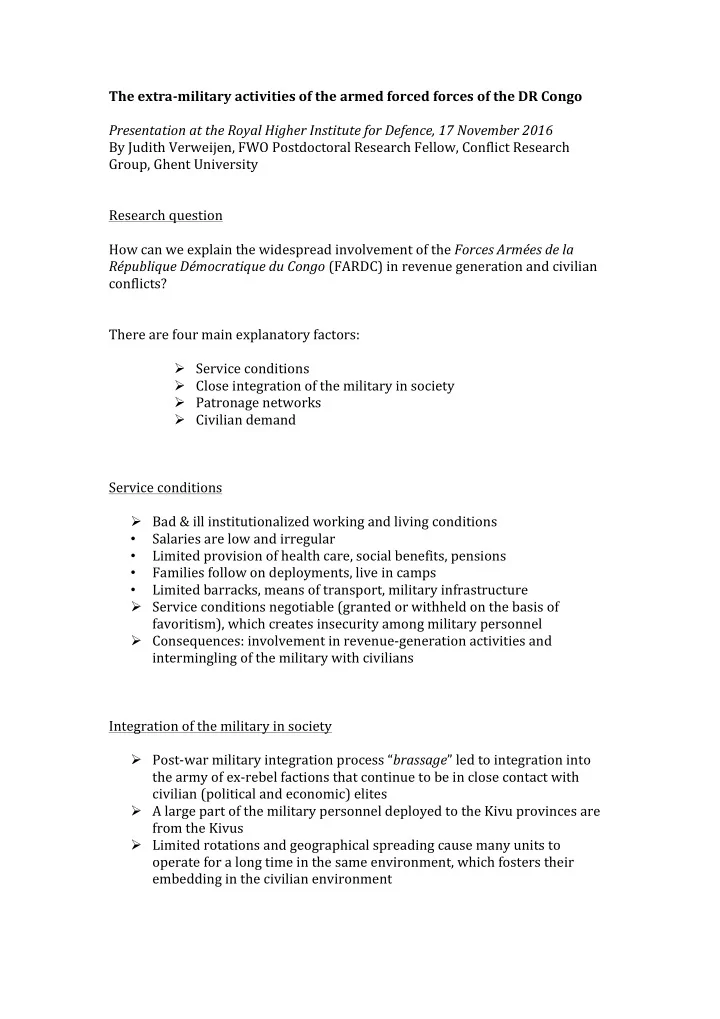

The extra-military activities of the armed forced forces of the DR Congo Presentation at the Royal Higher Institute for Defence, 17 November 2016 By Judith Verweijen, FWO Postdoctoral Research Fellow, Conflict Research Group, Ghent University Research question How can we explain the widespread involvement of the Forces Armées de la République Démocratique du Congo (FARDC) in revenue generation and civilian conflicts? There are four main explanatory factors: � Service conditions � Close integration of the military in society � Patronage networks � Civilian demand Service conditions � Bad & ill institutionalized working and living conditions Salaries are low and irregular • • Limited provision of health care, social benefits, pensions Families follow on deployments, live in camps • • Limited barracks, means of transport, military infrastructure � Service conditions negotiable (granted or withheld on the basis of favoritism), which creates insecurity among military personnel � Consequences: involvement in revenue-generation activities and intermingling of the military with civilians Integration of the military in society � Post-war military integration process “ brassage ” led to integration into the army of ex-rebel factions that continue to be in close contact with civilian (political and economic) elites � A large part of the military personnel deployed to the Kivu provinces are from the Kivus � Limited rotations and geographical spreading cause many units to operate for a long time in the same environment, which fosters their embedding in the civilian environment
Patronage networks � Patronage networks intersect with formal command chains, creating divided loyalties � Within patronage networks, granting/withholding (access to) resources is an important means of establishing authority, therefore revenue generation is entwined with power projection in the army � Promotions and the distribution of positions occur partly on the basis of patronage rationalities (and performance in income generation), not merit � Rapid rotations of office make that those who currently hold a position reap the benefits (in terms of revenue generation) as soon as it lasts � Patronage networks create pressures on military personnel both from within and outside armed forces to engage in revenue generation and intervene in conflicts, as patrons needs to grant favors to clients Civilian demand Both civilian elites and non-elites solicit army officers for traffic d’influence (influence peddling), like pressure on authorities (e.g. to influence decision- making), the protection of illegal activities and interventions in disputes (e.g. by putting pressure on the contending party). Reasons: � Rampant multi-dimensional insecurity in eastern Congo � Weakness state-led civilian governance structures, including police and justice � Civilians tied to military personnel in patronage networks demand favors in exchange for loyalty � Opportunism, shifting norms, it has become a “normal” practice to demand interventions from military personnel However, many interventions do not take place on the demand of civilians, but out of imposition by the military, for whom arranging civilian conflicts is an important source of income Conclusions Since the involvement of the army in civilian affairs and revenue generation has multiple inter-related causes, a multi-pronged approach is needed, including: � Rendering service conditions not only better but also more secure/predictable � Reducing the “civilianization” of the army by a better policy of rotations and separate facilities and accommodation � Looking at extra-military factors: reinforcing civilian authority, reducing the acceptability of approaching the military for intervention in civilian affairs
Further reading Eriksson Baaz, M. and Verweijen, J. 2014, “Arbiters with guns: The ambiguity of military involvement in civilian disputes in the DR Congo”, Third World Quarterly , 35 (5), 803–820. Eriksson Baaz, M. and Verweijen, J. 2013, Between Integration and Disintegration. The Erratic Trajectory of the Congolese Army. Prepared for the DRC Affinity Group, Social Science Research Council (New York: SSRC) http://www.ssrc.org/publications/view/between_integration_and_disintegratio n_the_erratic_trajectory/ Stearns, J., Verweijen, J. and Eriksson Baaz, M. 2013, The National Army and Armed Groups in the Eastern Congo: Untangling the Gordian Knot of Insecurity (London: Rift Valley Institute) http://riftvalley.net/publication/national-army-and-armed-groups-eastern- congo#.WDfzPXeZNp8 Verweijen, J. 2013, “Military business and the business of the military”. Review of African Political Economy , 40 (135), 67–82
Recommend
More recommend